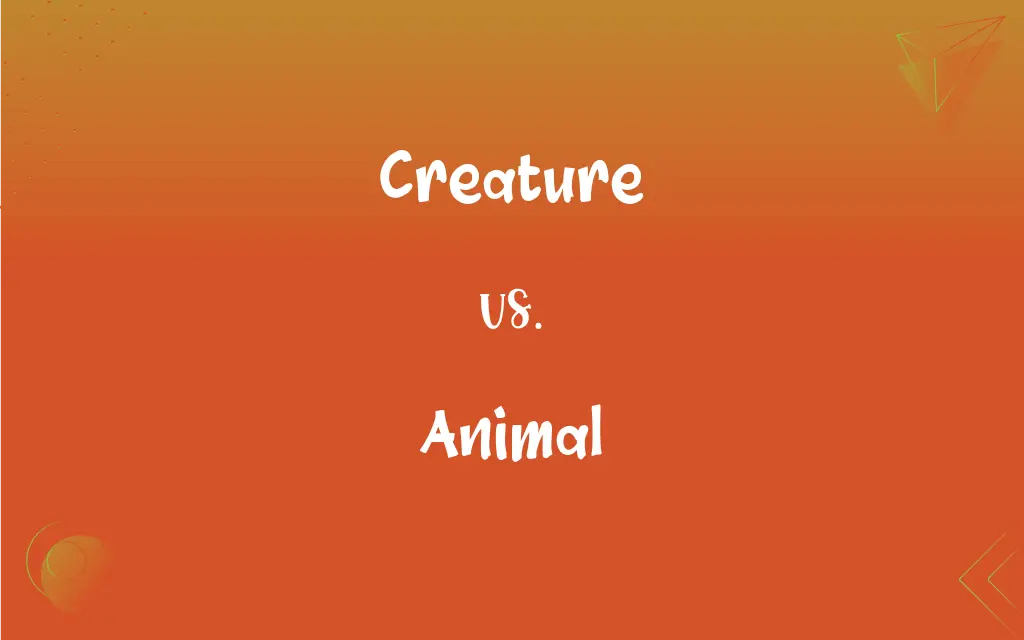Creature vs. Animal: What's the Difference?
Edited by Aimie Carlson || By Harlon Moss || Updated on November 7, 2023
Creature encompasses all living beings, mythological entities, or monsters, while animal specifically refers to a living organism that moves and is not a plant.

Key Differences
A creature is an all-encompassing term that refers to any living or imaginary being. This includes animals, humans, mythical beings, and even extraterrestrial life forms. In contrast, an animal is specifically a biological term that classifies a group of living beings that consume organic material, breathe oxygen, are able to move, reproduce sexually, and grow from a hollow sphere of cells (the blastula) in embryonic development.
The word creature can refer to anything that has been created, whether it is found in reality or fiction. It does not necessarily have to fall within the biological classification of Animalia. Animals, however, are a subset of creatures that are characterized by their biological processes and are categorized scientifically based on their anatomical and genetic makeup.
In literature and storytelling, the term creature often carries a connotation of the unknown or the fantastical. It can invoke a sense of wonder or fear, depending on its context. Animals, while they can be interesting and sometimes mysterious, are understood as a part of the natural world and do not inherently carry these connotations.
In religious or philosophical discussions, every animal is considered a creature, as the term signifies the act of creation, typically by a deity or a higher power. However, not every creature is an animal, as this would exclude beings such as angels, demons, or other spiritual entities that are often considered creatures but do not have the biological characteristics of animals.
When it comes to legal and ethical discussions, rights and protections are often granted to animals, especially vertebrates, due to their capacity for pain and suffering. Creature, in this context, is seldom used, as it is a broader term and does not pertain specifically to the welfare of animals.
ADVERTISEMENT
Comparison Chart
Definition
Any living or mythical being.
A living organism with sensory and motor capabilities, not a plant.
Scope
Broad, includes all organisms and mythological entities.
Narrow, limited to the kingdom Animalia.
Usage in Context
Can imply mythical or otherworldly beings.
Refers to real, scientifically classified beings.
Connotation
May carry a fantastical or mysterious tone.
Generally viewed within the context of the natural world.
Classification
Does not require a biological framework.
Classified scientifically based on anatomy and genetics.
ADVERTISEMENT
Creature and Animal Definitions
Creature
Any being that is living or imagined.
The children believed a strange creature lurked in the woods.
Animal
A living organism that feeds on organic matter, typically having specialized sense organs and nervous system.
The lion, a majestic animal, is often called the king of the jungle.
Creature
An animal, especially a nonhuman.
The zoo was home to creatures from around the globe.
Animal
A person who exhibits the physical characteristics or instincts of a nonhuman being.
He was an animal on the football field, unstoppable by the opposing team.
Creature
A being of any kind.
Creatures of the deep sea often seem alien to us.
Animal
Any such living thing other than a human being.
In the forest, you can find an abundance of wild animals.
Creature
A person considered to be unpleasant or difficult.
He's such a strange creature, always muttering to himself.
Animal
A mammal, as opposed to a bird, reptile, fish, or insect.
The kangaroo is an animal that carries its young in a pouch.
Creature
A fictional being with distinct characteristics in literature or film.
The creature in the novel could become invisible at will.
Animal
A living organism characterized by voluntary movement.
The cheetah is the fastest land animal.
Creature
A living being, especially an animal
Land creatures.
Microscopic creatures in a drop of water.
Animal
Any of numerous multicellular eukaryotic organisms of the kingdom Metazoa (or Animalia) that ingest food rather than manufacturing it themselves and are usually able to move about during at least part of their life cycle. Sponges, jellyfishes, flatworms, mollusks, arthropods, and vertebrates are animals.
Creature
A human.
Animal
An animal organism other than a human, especially a mammal.
FAQs
Are all creatures animals?
No, not all creatures are animals; some are mythical or human.
Are plants considered creatures?
No, plants are not typically referred to as creatures.
Does 'creature' have a mythological connotation?
Often, yes. 'Creature' can refer to mythological or fictional beings.
Are all animals considered creatures?
Yes, all animals are a type of creature.
Can the term 'creature' refer to humans?
Yes, humans can be referred to as creatures.
Is 'animal' a scientific term?
Yes, 'animal' is used scientifically to describe multicellular, eukaryotic organisms in the kingdom Animalia.
Are creatures part of natural science classification?
Creatures are not a part of the scientific classification; it's a broader term.
Can 'creature' be derogatory when referring to a person?
Yes, calling a person a creature can be derogatory.
Can 'creature' refer to an extraterrestrial being?
Yes, extraterrestrial beings can be referred to as creatures.
Is an insect an animal?
Yes, an insect is an animal.
Is it correct to use 'creature' for non-living entities?
No, 'creature' implies some form of life or imagined life.
Can the term 'animal' refer to fantastical beings?
Typically no, 'animal' is used for real, non-human living organisms.
Does 'animal' imply a certain size or type?
No, 'animal' can refer to any size or type, from microscopic to massive.
In legal terms, are rights given to creatures or animals?
Legal rights are usually specified for animals, particularly for their protection and welfare.
Are bacteria considered animals or creatures?
Bacteria are neither animals nor traditionally called creatures; they belong to a different domain of life.
Are fictional characters like vampires considered creatures?
Yes, they are often referred to as creatures.
Are single-celled organisms animals or creatures?
Single-celled organisms are not animals; they can be considered creatures in a broad sense.
Are mythical animals considered creatures in literature?
Yes, mythical animals are often referred to as creatures in literature.
Do all animals have a brain?
Most, but not all, animals have some form of a nervous system or brain.
Do the terms 'creature' and 'beast' mean the same?
'Beast' often refers to a large or dangerous animal, while 'creature' is a more general term.
About Author
Written by
Harlon MossHarlon is a seasoned quality moderator and accomplished content writer for Difference Wiki. An alumnus of the prestigious University of California, he earned his degree in Computer Science. Leveraging his academic background, Harlon brings a meticulous and informed perspective to his work, ensuring content accuracy and excellence.
Edited by
Aimie CarlsonAimie Carlson, holding a master's degree in English literature, is a fervent English language enthusiast. She lends her writing talents to Difference Wiki, a prominent website that specializes in comparisons, offering readers insightful analyses that both captivate and inform.
































































